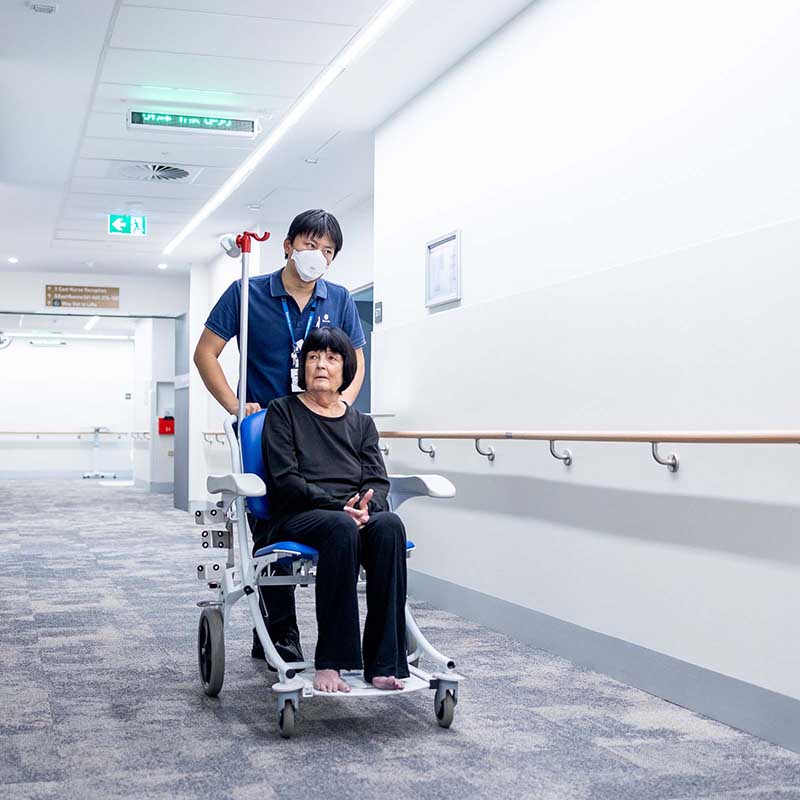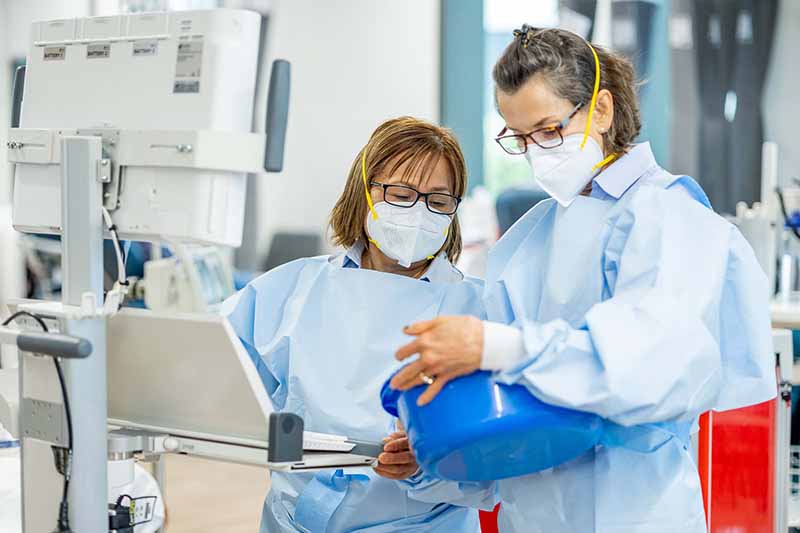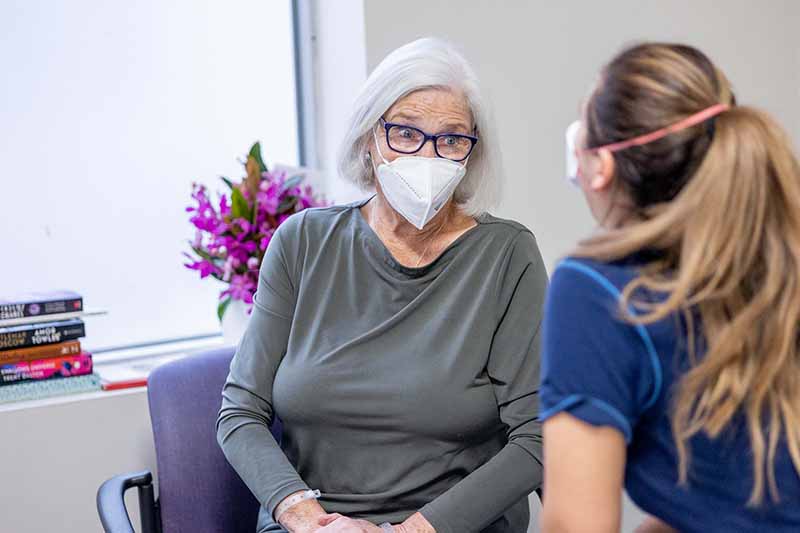Overview
Learning that you or someone you care for has bladder cancer can be a very overwhelming and frightening experience. From initial diagnosis through to cure or relapse, our Epworth care team are here to support you and your family at every step of the cancer care journey.
Each person living with bladder cancer has individual needs depending on their symptoms, health history and stage of cancer. Our team will proactively adjust the level of emotional and physical care provided to best suit your changing care needs and provide further options of support such as physiotherapy, dietitians, and psychologists as required.
Epworth fact sheet | What is bladder cancer?
Bladder cancer and Epworth
Epworth specialises in the treatment of bladder cancer, with many of Australia's leading urologists practising at Epworth.
-
What is bladder cancer?Bladder cancer occurs when abnormal cells in the bladder's lining uncontrollably multiply.
-
What are the different types of bladder cancer?
There are three main types of bladder cancer:
- Urothelial cell carcinoma
- Squamous cell carcinoma
- Adenocarcinoma
-
The most common type of bladder cancerUrothelial carcinoma is the most common type of bladder cancer and occurs in more than 90% of cases. This cancer starts in the urothelial cells that line the inside of the bladder.
-
What are the risk factors for bladder cancer?
Risk factors for bladder cancer are not fully understood, but the below factors may increase the chances of developing bladder cancer.
Some risk factors for bladder cancer include:- Smoking tobacco
- Age - the risk increases with age
- Chemical exposure - such as benzene
Bladder cancer symptoms
If you have noticed blood in your urine, it is important to consult your GP as soon as possible.
What are common bladder cancer symptoms?
The most common symptom of bladder cancer is blood in your urine. Other symptoms of bladder cancer can be difficult to recognise as they can be similar to less serious conditions such as UTIs. If your symptoms persist or you have a family history of bladder cancer, it's important to speak with your GP as soon as possible.
Blood in the urine
Blood in the urine won't necessarily cause pain and may not be consistently visible each time you urinate. Blood may change the urine to a pink colour or be difficult to detect by eyesight, so you must speak with your GP if you experience any of the listed symptoms.
Symptoms of bladder cancer can include:
- Blood in the urine (haematuria)
- Pain or burning sensation while urinating (dysuria)
- Lower back pain
- Needing to urinate frequently
- Unexplained weight loss
- Problems emptying the bladder
Notice changes and act quickly
Diagnosing bladder cancer
Currently, there is no screening test for bladder cancer. Speak with your GP if you notice any blood in your urine.
How is bladder cancer diagnosed?
Epworth provides a range of comprehensive diagnostic tests to investigate any concerns and accurately diagnose bladder cancer.
If you are formally diagnosed with bladder cancer, your Epworth specialist will likely recommend further tests to understand whether cancer has spread. These tests will allow your care team to establish your cancer stage as 1 to 4 and create a unique treatment plan.
Common diagnostic tests for bladder cancer:
Blood tests
Blood tests can be arranged to support other diagnostic results to formally diagnose or investigate the stage of bladder cancer.
Internal exam
As the bladder is located close to the rectum and vagina, your doctor may organise an internal exam. An internal exam only lasts for a few seconds and involves your doctor interesting their fingers to feel for anything unusual.
Urine tests
Providing a urine test allows your doctor to check for blood in your urine. If blood is found in your urine, you may be asked to undergo more tests to eliminate other health concerns.
Cystoscopy
During a cystoscopy, your Epworth urologist will use an instrument called a cystoscope to look inside the bladder. A cystoscope is a thin tube with a small camera. Cystoscopy is an essential test for bladder cancer patients as small tumours may be missed on alternative tests such as CT scans.
Medical imaging
Your doctor may request that you undergo medical imaging such as a computerised tomography (CT) scan or ultrasound. These scans provide urologists with images of your bladder and other parts of the body to understand if cancer has spread.
Staging - Investigating the extent of the cancer
Staging helps your care team and specialists to create a unique treatment plan. During your initial diagnostic tests, your care team may be able to stage your cancer at the same time during a biopsy or medical imaging.
What does my cancer stage mean?
Staging is a term used to describe the size of the cancer and whether it has spread. Staging helps your care team and specialists to create a unique treatment plan.
Stage 1
The cancerous tumour is relatively small and the cancer has not yet spread to other tissue.
Stage 2
The cancerous tumour remains relatively localised but has spread to nearby tissue beyond its origin.
Stage 3
Cancer has spread regionally and affected surrounding tissue, and may have grown.
Stage 4
Sometimes called advanced cancer, stage 4 means cancer has spread to other tissue or organs beyond the region where it originated.
Find your Epworth specialist for bladder cancer
Urologists | Medical oncologists | Radiation oncology service
Bladder cancer treatment
We understand that treatment options can be overwhelming. Epworth specialists are here to guide and support you to make the best choice for your cancer care journey.
Bladder cancer treatment at Epworth
Our patients are treated in the Urology units of our hospitals which offer a specialised variety of surgical procedures, chemotherapy, and radiotherapy treatment for bladder cancer. Our care team are here to provide you with outstanding treatment, access to talented, caring specialists and support you and your family during this challenging time.
Your treatment plan will be tailored to your specific stage and type of bladder cancer. Below is an overview of common bladder cancer treatments:
- Chemotherapy
Chemotherapy is a common form of treatment for bladder cancer that involves the use of anti-cancer drugs to attack cancer cells. Chemotherapy is often used alongside other treatments such as radiotherapy or surgery. - Radiotherapy
Radiotherapy is the use of radiation to treat and manage cancer. Supported by the latest world-class technology and evidence-based techniques, a highly experienced team of radiation oncologists, radiation therapists, physicists and nurses are committed to providing compassionate, exceptional care for patients and their loved ones. - Bladder cancer surgery
There is a range of surgical procedures for bladder cancers. Each type depends on whether the cancer is invasive (has spread to other parts of the body) or non-invasive. If you are a suitable patient for bladder cancer surgery, your urologist will explain the specific surgical options to best treat your cancer.
Why choose Epworth for cancer care?
Epworth HealthCare is Victoria's largest not-for-profit private hospital group. Renowned for excellence in diagnosis, treatment, care and rehabilitation. Epworth is an innovator in Australia’s health system, embracing the latest in evidence-based medicine to pioneer treatments and services for our patients.
Supported by excellent facilities, we integrate clinical practice with education and research to deliver outstanding patient care, each and every day.
Epworth cancer care locations
Epworth Rehabilitation
Bladder cancer locations:
Bladder cancer rehabilitation
Rehabilitation doesn't start after your treatment has ended. You may benefit from our holistic rehabilitation programs at any time throughout your cancer journey. Our programs can support you to physically and emotionally prepare for treatment and restore your strength and wellbeing.
What does the cancer rehabilitation program involve?
Before you start
You will meet a rehabilitation doctor and allied health team for a medical, psychosocial, and physical assessment.
Everyone's cancer care journey is different. The assessments will help the team understand your specific needs to develop the right program for you. You will work with the team to develop goals to work towards throughout the program.
During the program
Depending on your assessment and individual needs, you may complete your program:
- as part of a group, with other people, who have been diagnosed with varying cancers
- on your own
Most people will attend as an outpatient, coming to hospital for a few hours once or twice a week, over several weeks. Some people may need to stay overnight in hospital and complete a program over several consecutive days.
Either way, you will receive the same support from our team to address your physical, functional and emotional needs.
Your program may include:
- A physical exercise component to help restore movement, strength and fitness
- An educational component where you will learn about different areas associated with your cancer diagnosis and treatment and how to manage them, including:
- fatigue
- pain
- emotional wellbeing
- body image and self-esteem
- work or family challenges
- relationships
- late-onset of side effects.
At the end of your program
Our rehabilitation team will keep in touch with your referring doctor and/or treating team throughout the program and our team will keep them informed about your progress.
They will also connect you to local services and support networks so you can leave our program with the strength and confidence to live life to your fullest potential.
Who will support me during the rehabilitation program?
Depending on your needs, you may see some or all of our multidisciplinary team which includes:
- Rehabilitation specialist doctor
- Cancer nurse
- Exercise physiologist
- Physiotherapist
- Psychologist
- Social worker
- Occupational therapist
- Dietitian.
How can I access a rehabilitation program?
Referrals
A referral from your specialist or GP is required to participate.
Ask your doctor to complete the referral form at www.epworth.org.au/rehab and return it to us via fax: 03 9982 6696 or email: [email protected]
Locations
Group programs are located at Epworth Camberwell and Epworth Hawthorn.
Individual programs can be accessed at Epworth Camberwell, Epworth Geelong, Epworth Hawthorn or Epworth Richmond Rehabilitation.
Contact us
If you have any questions about our cancer rehabilitation programs, call us on: 1300 345 600.
Life after bladder cancer treatment
Life after bladder cancer treatment can pose its own challenges but our Epworth specialists are here to support you.
Life after treatment
Life after bladder cancer treatment can be a mixture of emotions. You may not 'bounce back' as quickly as you like, but be kind to yourself and start making plans with your family or carers.
Remember that:
- You may still feel fatigued for a while after finishing treatment.
- If required, make an advanced care plan.
- Ask for help. If your body has changed due to treatment, remember help is out there to support you to feel your best and regain your sense of identity and self-esteem. Speak with your care team about options to support your general wellbeing after treatment.
Follow-up appointments
Epworth patients in remission from bladder cancer will likely need follow-up appointments to ensure abnormal cells have not returned and to check in on your overall wellbeing.
Managing your health and wellbeing ongoing
Knowing how to best manage your wellbeing ongoing is an essential step toward recovery. We encourage people who have been living with bladder cancer to check out additional resources through Cancer Council, BEAT Bladder Cancer Australia and Bladder Cancer Charity Foundation.
Find your Epworth specialist for bladder cancer
Urologists | Medical oncologists | Radiation oncology service



